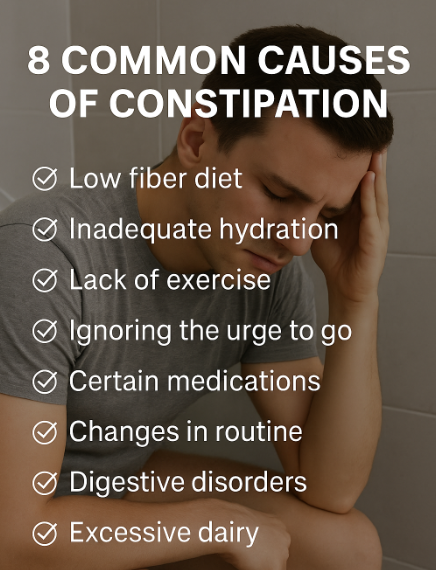8 Common Causes of Constipation (and How to Avoid Them)
Struggling with constipation? Discover the 8 most common causes of constipation and simple tips to relieve it naturally.
WELLNESSHEALTHBLOG-LIST
Narcisse Bosso
9/13/20252 min read


In Brief
Constipation is one of the most frequent digestive complaints, affecting nearly everyone at some point. While occasional constipation is normal, chronic constipation can be uncomfortable and signal an imbalance in your diet or lifestyle. The good news? By understanding the main causes, you can make simple changes to support smoother, healthier digestion.
👉 Also read: 9 Drinks That Boost Your Gut Health
Table of Contents
Low Fiber Intake
Not Drinking Enough Water
Sedentary Lifestyle
Ignoring the Urge to Go
Excess Processed Foods
Stress and Anxiety
Medication Side Effects
Hormonal Changes
1. Low Fiber Intake
Fiber adds bulk to stool and helps it pass more easily through your intestines. Diets low in fruits, vegetables, whole grains, and legumes often lead to constipation.
💡 Tip: Aim for at least 25–30g of fiber per day.
2. Not Drinking Enough Water
Dehydration is a leading cause of constipation. Without enough fluids, stools become hard and difficult to pass.
💡 Tip: Drink at least 1.5–2 liters of water daily. Herbal teas and water-rich foods (like cucumber and watermelon) also help.
3. Sedentary Lifestyle
Lack of movement slows down intestinal motility. People who sit for long hours or avoid exercise are more prone to constipation.
💡 Tip: Include at least 30 minutes of physical activity daily, walking, yoga, or light exercise can stimulate digestion.
4. Ignoring the Urge to Go
Holding back bowel movements too often can cause stool to become drier and harder to pass. Over time, this habit worsens constipation.
💡 Tip: Go to the bathroom as soon as you feel the urge.
5. Excess Processed Foods
Foods high in sugar, fat, and refined flour (like fast food, pastries, or chips) lack fiber and slow down digestion.
💡 Tip: Prioritize whole, nutrient-dense foods over ultra-processed snacks.
6. Stress and Anxiety
Stress affects the gut-brain connection, which regulates digestion. Emotional tension can slow down bowel movements and contribute to constipation.
💡 Tip: Try stress-management techniques such as deep breathing, meditation, or journaling.
7. Medication Side Effects
Certain medications, including painkillers, antidepressants, and iron supplements, may cause constipation as a side effect.
💡 Tip: If constipation becomes chronic, talk to your healthcare provider about alternatives or supportive remedies.
8. Hormonal Changes
Hormonal fluctuations, especially during pregnancy, menstruation, or menopause, can affect bowel regularity.
💡 Tip: Balance hormones naturally with a healthy diet, regular exercise, and hydration.
Conclusion
Constipation often results from diet, lifestyle, or stress factors, but the solution is usually simple: more fiber, water, movement, and mindful habits. By addressing the root causes, you can restore balance to your digestive system and prevent future discomfort.
💡 Action Step: This week, try increasing your fiber intake and drinking more water,you might notice relief in just a few days.
👉 Explore more natural health tips on Behealfit Blog.
✍️ Written by Narcisse Bosso, certified naturopath, passionate about holistic health and natural solutions.
